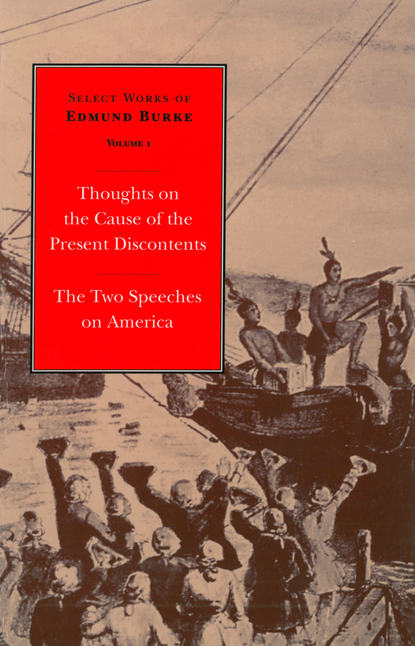Select Works of Edmund Burke: Thoughts on the Cause of the Present Discontents and The Two Speeches on America
SELECT WORKS OF EDMUND BURKE
VOLUME 1
SELECT WORKS OF EDMUND BURKE
A NEW IMPRINT OF THE PAYNE EDITION
VOLUME 1
THOUGHTS ON THE CAUSE OF THE
PRESENT DISCONTENTS
THE TWO SPEECHES ON AMERICA
VOLUME 2
REFLECTIONS ON THE
REVOLUTION IN FRANCE
VOLUME 3
LETTERS ON A REGICIDE PEACE
MISCELLANEOUS WRITINGS
This book is published by Liberty Fund, Inc., a foundation established to encourage study of the ideal of a society of free and responsible individuals.
The cuneiform inscription that serves as our logo and as a design element in Liberty Fund books is the earliest-known written appearance of the word “freedom” (amagi), or “liberty.” It is taken from a clay document written about 2300 B.C. in the Sumerian city-state of Lagash.
© 1999 by Liberty Fund, Inc.
This eBook edition published in 2013.
eBook ISBNs:
978-1-61487-074-6
978-1-61487-162-0
CONTENTS
THOUGHTS ON THE CAUSE OF THE PRESENT DISCONTENTS
SPEECH ON MOVING RESOLUTIONS FOR CONCILIATION WITH THE COLONIES
The first three volumes of this set of Select Works of Edmund Burke, fully edited by Edward John Payne (1844–1904), were originally published by the Clarendon Press, Oxford, from 1874 to 1878. Liberty Fund now publishes them again, with a fourth volume of additional writings by Burke. The original set has been praised by Clara I. Gandy and Peter J. Stanlis as “an outstanding critical anthology of Burke’s essential works on the American and French revolutions”; and they went on to say: “The scholarship and criticism is perhaps the best on Burke during the last quarter of the nineteenth century.”1
E. J. Payne was born in England to parents “in humble circumstances,” as the Dictionary of National Biography phrases it. No doubt for that reason, the Dictionary goes on to say that he “owed his education largely to his own exertions.”2 Nonetheless he was able at age twenty-three to matriculate at Magdalen Hall, Oxford, from which he transferred to Charsley’s Hall. He graduated B.A. in 1871, with a first class in classics. The following year he was elected to a fellowship in University College, Oxford. He was married in 1899 and therefore had to resign his fellowship, but was re-elected to a research fellowship in 1900. To the end of his days he took an active part in the management of College affairs.
He was called to the bar at Lincoln’s Inn in 1874, but devoted himself mainly to research and writing, especially on English colonial history and exploration, on which subjects he published rather widely. He also wrote on music, and was an accomplished violinist. His introductions and notes to these Select Works show him also to have been well versed in English, French, Italian, and classical literature as well as in history.
The first of these volumes contains Burke’s great speeches on the crisis between Great Britain and her American colonies, On American Taxation (1774) and On Conciliation with the Colonies (1775). They are preceded by his pamphlet Thoughts on the Cause of the Present Discontents (1770), which sets forth the political creed of the Whig faction led by the Marquis of Rockingham, for whom Burke acted as spokesman. The unifying theme of all three documents is Burke’s fear of arbitrary power divorced from political prudence. In the Present Discontents it was the power of the Crown and in the American speeches it was the sovereignty of the Mother Country that he argued were being exercised in an arbitrary and foolish manner.
The second volume is devoted wholly to Burke’s best-known work, Reflections on the Revolution in France (1790); the third, to his Letters on a Regicide Peace (between Great Britain and revolutionary France), which were written in 1796 and 1797. In these volumes he again expresses a detestation of arbitrary power, in this case of the sovereign people, which in practice was really the power of an oligarchy posing as a democracy.
The fourth volume contains writings that express Burke’s views on representation in Parliament, on economics, on the political oppression of the peoples of India and Ireland, and on the enslavement of African blacks.
One of the attractive features of Burke’s political thought is his keen awareness of the way in which reason operates in political judgments. He so heavily emphasized the roles of tradition, even to the point of calling it prejudice, and of sentiment and emotion in politics that it is easy to overlook his insistence that it was reason, not will, that should govern in the affairs of men. Mere will was arbitrary; reason recognized and took into account the complexity of reality. But it was practical, prudential reason, not abstract ideology, that should determine political decisions.
Thus, in his American speeches, while he did not deny Great Britain’s right to tax the colonies, he severely questioned the wisdom of trying to do so without the consent of the colonists. His objection to the French Revolution, and to the British radicalism that agreed with it, was not to democracy in the abstract (though he thought it unsuited to any large country), but to the doctrine of the “rights of men,” which the new French government had stated early in the Revolution
